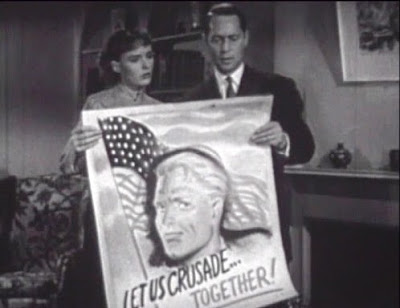Jigsaw delivers a
fair 1940s crime drama involving a hate group, with cameo appearances by stars
who give it the effect of a public service announcement at the beginning of the
Hollywood political blacklist period.
Actor Fletcher Markle’s 72-minute début as writer-director
does not flesh out the shadowy right-wing “Crusade” at the heart of the story, more
than to highlight a fraternity of double-breasted miscreants who assert their “inalienable
right” to hate aliens in their “Fight for America”. Nor does Markle identify
the aliens. But the rascals and the brain behind them will be no surprise to
viewers in the Trump era. Reporter Charles Riggs (Myron McCormick) tells Manhattan
prosecutor Howard Malloy (Franchot Tone): “Now we
got people around who want to make people hate each other, be afraid of each
other, just so they can make money out of it. I don’t like that.”
Our synopsis contains no plot-spoilers. The story opens with the murder of a small printing press owner on an ominously empty block of West 31st Street. Malloy is the man-about-Manhattan assistant district attorney assigned to the case. He is engaged to Caroline Riggs (Doe Avedon), sister of the intrepid independent reporter hot on the Crusade’s trail.
Malloy meets Charlie Riggs in a midtown bar for his lowdown
on the organization. Riggs declines to share specifics; he assures Malloy he is
close to breaking a story. He leaves ordering a last round and tells Malloy to
pick up the tab. Malloy tells Jack the bartender that he never drinks alone.
“That can be fixed,” says Jack (Burgess Meredith in cameo), raising and downing
Riggs’s abandoned drink.
The plot leads Malloy to a singer in a fancy midtown supper
club, The Blue Angel. This was an actual club on West 55th Street. Soon after
Malloy and Caroline Riggs arrive, the singer takes a break and an actual blue
angel leaves the club—Marlene Dietrich. Dietrich sang in a German dive of the
same name in her 1930 breakout film, Der
blaue Engel, from which the supper club took its name. A waiter
comes to take their order—Henry Fonda, like Steve Buscemi at Jackrabbit Slim’s
in Pulp Fiction, though Fonda was a
much bigger star. When Malloy asks the waiter when the show starts, we hear
Fonda’s distinct voice condescend to reply: “That was the supper act”.
The singer Barbara Whitfield is Jean Wallace, Tone’s wife at
the time, with whom his character has better chemistry than with his fiancée in
the story. Modern viewers probably will not recognize celebrities of that
period such as the actors John Garfield, Everett Sloane, and Marsha Hunt in
their brief walk-ons. Markle himself, New York Post columnist Leonard Lyons,
and socialite Brenda Frazier also appear in cameo roles.
The aliens do
not include Angelo Agostini (Marc Lawrence), a hardscrabble ethnic Italian fixer
with mob connections. We learn that the Crusade issues uniforms and insignia, see
it try to intimidate the weak and use a gunsel named “Knuckles” Miller (George
Breen in his sole movie appearance) to do its wet work.
It is no coincidence that the film came out at the beginning
of the blacklist era which gained momentum in October 1947 when the US House
Un-American Activities Committee began to subpoena people working in the
Hollywood film industry to testify at hearings about alleged communist
sympathies. Many actors in Jigsaw
were left-leaning; Meredith, under suspicion at the time, subsequently was
among those blacklisted. Dietrich voted with her feet twenty years earlier
against this kind of behavior in other circumstances.
Otto Preminger bookended the Hollywood blacklist era in his
1962 classic Advise & Consent when
he brought Tone and Fonda together as a left-leaning president and his
Secretary of State appointee opposed by zealous right-wingers, and cast the blacklisted
Meredith as an evidence-giving Red.
Jigsaw (1949) US
(72 minutes). Directed by Fletcher Markle; screenplay by Markle and Vincent
O’Connor, based on a story by Joe Roeburt; cinematography by Don Malkames;
edited by Robert Matthews; music by Robert W. Stringer; produced by Edward J.
and Harry Lee Danziger.









No comments:
Post a Comment